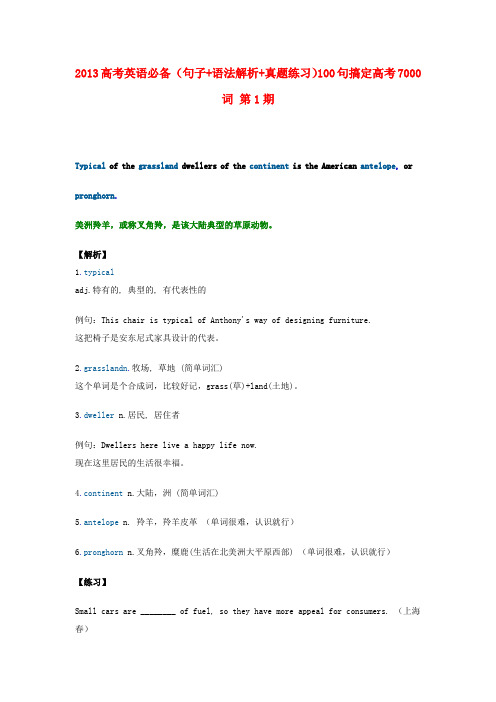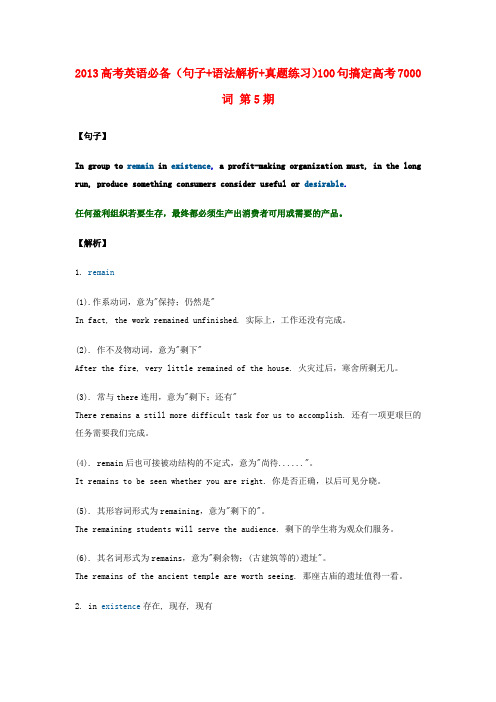2013高考英语必备 (句子+语法解析+真题练习)100句搞定高考7000词 第29期
高考英语必备 (句子+语法解析+真题练习)100句搞定高考7000词 第1期

2013高考英语必备(句子+语法解析+真题练习)100句搞定高考7000
词第1期
Typical of the grassland dwellers of the continent is the American antelope, or pronghorn.
美洲羚羊,或称叉角羚,是该大陆典型的草原动物。
【解析】
1.typical
adj.特有的, 典型的, 有代表性的
例句:This chair is typical of Anthony's way of designing furniture.
这把椅子是安东尼式家具设计的代表。
2.grasslandn.牧场, 草地 (简单词汇)
这个单词是个合成词,比较好记,grass(草)+land(土地)。
3.dweller n.居民, 居住者
例句:Dwellers here live a happy life now.
现在这里居民的生活很幸福。
4.continent n.大陆,洲 (简单词汇)
5.antelope n. 羚羊,羚羊皮革(单词很难,认识就行)
6.pronghorn n.叉角羚,糜鹿(生活在北美洲大平原西部) (单词很难,认识就行)
【练习】
Small cars are ________ of fuel, so they have more appeal for consumers. (上海春)
A.economical
B.free
C.short
D.typical。
2013高考英语必备 (句子+语法解析+真题练习)100句搞定高考7000词 89期

100句搞定高考7000词:第89期【句子】Because of the space crunch, the Art Museum has become increasingly cautious in considering acquisitions and donations of art, in some cases passing up opportunities to strengthen is collect ions.由于空间不足,艺术博物馆在考虑购买和接受捐赠的艺术品是越来越慎重,有些情况下放弃其进一步改善收藏的机会。
【解析】1.crunch1)vt. 嘎吱嘎吱地咀嚼:The dog was crunching a bone.那只狗正在嘎吱嘎吱地啃骨头。
2)vt.(脚、车轮等)嘎吱地压过(或踏过):Our feet crunched the gravel.我们双脚嘎吱做声地踩着碎石子。
3)vt.财政上紧缩:The administration's policy seems to crunch the economy in order to combat inflation.政府的政策似乎是紧缩经济以免通货膨胀。
4)vt.使用复杂的技术压缩:It is too much trouble to crunch a file unless you use it often.除非经常用这些文件,不然压缩时很费事。
5)vi. 吃东西时发出嘎吱声;(踩踏、碾压时)发出嘎吱声:The frozen snow crunched under our feet.结冻的雪在我们脚下吱吱作响。
6)n. 嘎吱做声的咀嚼嘎吱嘎吱的声音不足;缺乏;物资的短缺;财政的困难;财政压力;(如信用等方面实行的)经济大压缩,经济的紧缩艰难局面,困境危急关头;关键时刻;危机 [亦作 craunch]2.become cautious in变得谨慎It is more likely that, as the crisis deepens, the government will become increasingly cautious in its approach to dome stic policy.随着危机的加深,更有可能的是,政府在处理国内政策时将变得越来越谨慎。
2013高考英语必备(句子+语法解析+真题练习)100句搞定高考7000词45期

2013高考英语必备(句子+语法解析+真题练习)100句搞定高考7000词45期2013 高考英语必备(句子+语法分析+真题练习)100句搞定高考7000 词 45 期【句子】Quails typically have short rounded wings thatenable them to spring into full flight instantly whendisturbed in their hiding places.典型的鹌鹑都长有短而圆的翅膀,凭此他们能够在吃惊时一跃而起,飞离它们的潜藏地。
此 word 下载后可自行编写2013高考英语必备(句子+语法解析+真题练习)100句搞定高考7000词45期12013高考英语必备(句子+语法解析+真题练习)100句搞定高考7000词45期【分析】1.typically (常有词汇)1)adv. 典型地;代表性地;往常Typically, he would come in late and then say that he had to go early.他一直是来得很晚,而后又总说他得早退。
2.spring (一定掌握词汇)1)n. 春季;春季;弹簧;弹力;跳;泉水;源泉此 word 下载后可自行编写2013高考英语必备(句子+语法解析+真题练习)100句搞定高考7000词45期22013高考英语必备(句子+语法解析+真题练习)100句搞定高考7000词45期It can be quite windy there, especially in spring.那边有时简单起风,特别在春季。
2)v. 跳;弹;快速站起;忽然提出;触发捕获器;(使 )裂开;爆炸;开释;涌出;生长;出现;矗立;(风)开始吹I hate to spring this on you at such short notice.很对不起,向你忽如其来提出这件事。
2)jump,leap,spring,hop,bound,skip辨析jump:是一般用词,指用双脚向上跳,向下跳,或在同一平面上跳到有必定距离的某一点上,或跳过。
高考英语必备 (句子+语法解析+真题练习)100句搞定高考

2013高考英语必备(句子+语法解析+真题练习)100句搞定高考7000词 53期【句子】Probabl y no man had more effect on the daily lives of most people in the Untied States than did Henry Ford a pioneer in automobile production.恐怕没有谁对大多数美国人的日常生活影响能超过汽车生产的先驱亨利.福特。
【解析】1.live的用法1) lively 有“活泼的、快活的、生动的”等意思,可以指人或物,可作定语或表语;但它没有“活着的”意思,而其他三个都有。
Young children are usually lively.小孩子们通常是活泼的。
2)alive、live、living都有“活的、有生命的”意思,与de ad意义相反。
但live通常只作前置定语,且一般用于动物;alive、living不仅可作定语(alive只能置于名词后;living 一般置于名词前,也可置于名词后),也可以作表语。
This is a live(=living) fish.(=This is a fish alive.)这是一条活鱼。
(指动物,且作定语时,三者均可用)3)living主要指在某个时候是活着的,而alive指本来有死的可能,但仍活着的。
而且,作主语补足语或宾语补足语时,只能用alive;作比喻义(如“活像。
”、“活生生的”等)解时,要用living。
He is the living image of his fathe r.(比喻义,不用alive)他活象他父亲。
4)只有living前加th e方可表示“活着的人”,作主语时,视作复数。
The living are more impo rtant to us than the dead.活着的人对我们来说比死去的人更重要。
高考英语必备句子语法解析真题练习100句弄定高考7000词76期

2013高考英语必备(句子+语法解析+真题练习)100句弄定高考7000词76期【句子】The beaver down trees to get food and material with which to build its home.水獭啃倒树木,以便取食物并取得造窝的材料。
【解析】1.n. 海狸,水獭A Finnish man survived an attack by a beaver.一名芬兰男子侥幸逃过一只海狸的攻击。
1)v. 嚼,咀嚼,咬,沉思,考虑,详细讨论,商量You must chew your food well before you swallo w it.食物吞下去之前先要细细咀嚼。
2)n. 咀嚼,咀嚼物I'll think about it while I have a chew.我吃饭时会想一想看。
3)常常利用短语chew out 严厉批评,训斥chew over 寻思,细想,仔细考虑chew the fat 闲聊,聊天chew up 嚼碎, 损坏, 消耗,chew,gn aw,snap的区别和用法1)bite:指用牙齿钳住或切断,或咬一口She bit the thread in two.她把线咬断了。
2)chew:指用牙磨碎She really chewed me out!她狠狠地责备了我一顿!3)gnaw:指持续不断用齿咬Minute after minute,her hunger gnawed at her. 饥饿的感觉每分钟都在咬啮着她。
4)snap:指突然猛咬The enormous fish snapped the line.一条大鱼咬住了4.1)n.材料;原料;素材;资料;题材;物质The workshop has shut down for lack of raw material.由于缺乏原料,这个车间已停工了。
2)adj.物质的;重要的;关键的;肉体上的;实质性的Material wealth doesn't equal spiritual wealth.物质的财富并不代表精神的财富!3)material,matter,substance,stuff简单辨析这些名词均含“物质,东西”之意。
高考英语必备 (句子+语法解析+真题练习)100句搞定高考7000词 第5期

2013高考英语必备(句子+语法解析+真题练习)100句搞定高考7000词第5期【句子】In group to remain in existence, a profit-making organization must, in the long run, produce something consumers consider useful or desirable.任何盈利组织若要生存,最终都必须生产出消费者可用或需要的产品。
【解析】1. remain(1).作系动词,意为"保持;仍然是"In fact, the work remained unfinished. 实际上,工作还没有完成。
(2). 作不及物动词,意为"剩下"After the fire, very little remained of the house. 火灾过后,寒舍所剩无几。
(3). 常与there连用,意为"剩下;还有"There remains a still more difficult task for us to accomplish. 还有一项更艰巨的任务需要我们完成。
(4). remain后也可接被动结构的不定式,意为"尚待......"。
It remains to be seen whether you are right. 你是否正确,以后可见分晓。
(5). 其形容词形式为remaining,意为"剩下的"。
The remaining students will serve the audience. 剩下的学生将为观众们服务。
(6). 其名词形式为remains,意为"剩余物;(古建筑等的)遗址"。
The remains of the ancient temple are worth seeing. 那座古庙的遗址值得一看。
高考英语必备 (句子+语法解析+真题练习)100句搞定高考
2013高考英语必备(句子+语法解析+真题练习)100句搞定高考7000词 54期【句子】The use of well-chos en nonsense words makes possible the testing of many basic hypotheses in the field of l anguage learning.使用精心挑选的无意义词汇,可以检验语言学科里许多基本的假定。
【解析】e的用法[1)used to do sth.意为"过去常常做某事",它表示过去经常发生的动作或存在的状态,而现在已不再发生或存在。
这个短语含有今昔对比之意,其否定形式常用used not to或didn't use to。
反意疑问句中应该用did/didn't或used/usedn't。
I used to swim in this river when I was young.我年轻时常在这条河里游泳。
2)be used to sth. / doing sth.意为"习惯、适应某事/做某事",它表示习惯于某一客观事实或状态,其中to是介词,后面跟名词、代词或动名词;be used可用于多种时态;如强调动作可用get或become替换beOld people ar e used to getting up early in the morning.老年人习惯早晨很早起床。
3)be used to do sth.意为"被用来做某事",其中use表"使用"之意,是被动语态形式,to 是动词不定式符号。
Wood can be used to make paper.树木可以用来造纸。
4)be used for...意为"被当做……",其中use表"使用"之意,是被动语态形式。
2013高考英语必备 (句子+语法解析+真题练习)100句搞定高考7000词 44期
2013高考英语必备(句子+语法解析+真题练习)100句搞定高考7000词 44期【句子】No social crusade aroused Elizabeth Williams’ enthusiasm more than the expansion of educational facilities for immigrants to the United States.没有什么社会改革运动比起给美国的新移民增加教育设施更能激发Elizabeth Williams的热情。
【解析】1.arouse1)v.叫醒;唤醒;激起;睡醒It took her some time to arouse her husband.她费了好一会儿才把丈夫叫醒。
2)arise、rise、rouse、arouse、raise的辨析:①arise(arose,arisen)occur“发生”,例:Problems arose from the outset.一开始就产生了很多问题。
arise from“起源于”,例:Accidents always arise from the carelessness.许多事故都源于粗心。
derive from=originate from“起因于,追本溯源”,例:Many English words derive from Latin.许多英语都来自于拉丁语。
②rise(rose,risen)v.“上升”,(一定是不及物的)n.“上升,上涨”give rise to=lead to引起,例:The food shortage gave rise to the serious problems.食品的短缺引起了严重的问题。
rouse“唤醒”,例:I was roused by the sound of the alarm.我被闹铃的声音吵醒。
arouse“唤起”,例:arouse one’s interest / sympathy“唤起某人的兴趣 / 同情心”③raise根本含义“使上升”“举起”raise one’s hand“提出”raise a question“抚养,相当于bring up”raise children“筹集”raise funds2.enthusiasmn.热情;热心;热衷的事物His refusal iced our enthusiasm.他的拒绝浇熄了我们的热情。
2013高考英语必备 (句子+语法解析+真题练习)100句搞定高考7000词 89期
100句搞定高考7000词:第89期【句子】Because of the space crunch, the Art Museum has become increasingly cautious in considering acquisitions and donations of art, in some cases passing up opportunities to strengthen is collect ions.由于空间不足,艺术博物馆在考虑购买和接受捐赠的艺术品是越来越慎重,有些情况下放弃其进一步改善收藏的机会。
【解析】1.crunch1)vt. 嘎吱嘎吱地咀嚼:The dog was crunching a bone.那只狗正在嘎吱嘎吱地啃骨头。
2)vt.(脚、车轮等)嘎吱地压过(或踏过):Our feet crunched the gravel.我们双脚嘎吱做声地踩着碎石子。
3)vt.财政上紧缩:The administration's policy seems to crunch the economy in order to combat inflation.政府的政策似乎是紧缩经济以免通货膨胀。
4)vt.使用复杂的技术压缩:It is too much trouble to crunch a file unless you use it often.除非经常用这些文件,不然压缩时很费事。
5)vi. 吃东西时发出嘎吱声;(踩踏、碾压时)发出嘎吱声:The frozen snow crunched under our feet.结冻的雪在我们脚下吱吱作响。
6)n. 嘎吱做声的咀嚼嘎吱嘎吱的声音不足;缺乏;物资的短缺;财政的困难;财政压力;(如信用等方面实行的)经济大压缩,经济的紧缩艰难局面,困境危急关头;关键时刻;危机 [亦作 craunch]2.become cautious in变得谨慎It is more likely that, as the crisis deepens, the government will become increasingly cautious in its approach to dome stic policy.随着危机的加深,更有可能的是,政府在处理国内政策时将变得越来越谨慎。
2013高考英语必备 (句子+语法解析+真题练习)100句搞定高考7000词 第95期
100句搞定高考7000词:第95期【句子】There is only one difference between an old man and a young one: the young man has aglorious future before him and old one has a splendid future behind him: and maybe that is where t he rub is.老人和年轻人之间只有一个区别:年轻人的前面有辉煌的未来,老年人灿烂的未来却已在它们身后。
这也许就是困难之所在【解析】1.glorious1)adj. 光荣的;辉煌的;极好的he glorious palace dazzled her.金碧辉煌的宫殿使她赞叹不已。
She is always bucking about her glorious p ast.她老是吹嘘她的光荣的过去。
2)同根词词根: gloryadj.glorified 变荣耀的,美其名的adv.gloriously 光荣地;辉煌地;壮观地,壮丽地n.glory 光荣,荣誉;赞颂v.glorified 赞美;美化(glorify的过去分词)vi.glory 自豪,骄傲;狂喜2.splendid1)adj. 华丽的,豪华的;壮丽的;优美的;辉煌的,显赫的;极好的,绝妙的The peacoc k spreads his splendid tail.[孔雀展开了它那灿烂夺目的尾巴。
The splendid evening glow in the sky means another fine day tomorrow. 灿烂的晚霞预示明天又是好天气。
2)同根词词根: splendidadj.sple ndiferous 极好的;浮华的adv.s plendidly 华丽地;豪华地;壮观地3.rub1)vt. 擦,摩擦;磨;揉;搓;按摩He rubbe d his forehead with the back of his hand.他用手背擦了擦前额。
- 1、下载文档前请自行甄别文档内容的完整性,平台不提供额外的编辑、内容补充、找答案等附加服务。
- 2、"仅部分预览"的文档,不可在线预览部分如存在完整性等问题,可反馈申请退款(可完整预览的文档不适用该条件!)。
- 3、如文档侵犯您的权益,请联系客服反馈,我们会尽快为您处理(人工客服工作时间:9:00-18:30)。
2013高考英语必备(句子+语法解析+真题练习)100句搞定高考7000
词第29期
【句子】
Alexander Graham Bell once told his family that he would rather be remembered as a teacher of the deaf than as the inventor of the telephone.
Alexander Graham Bell曾告诉家人,他更愿意让后人记住他是聋子的老师,而非电话的发明者。
【解析】
1.once的用法
1)once用作连词时,意为“一旦……就……”,用于连接时间状语从句,相当于as soon as
Once you begin to read it, you will like it.
一旦你开始读,你就会喜欢它。
2)once用作副词时,意为“曾经;一度;从前”。
它是一个不确定的时间副词,其位置一般是在行为动词之前,系动词之后。
Once he lived in America, but now he lives in England.
他曾经生活在美国,但现在他生活在英国。
3)once用作副词时作“一次”、“一遍”、“一倍”
We go to the plant once a day.
我们一天去工厂一次。
【注意】
注意once用作副词时,在句中的位置不同表示的意思也不同,所以要特别注意。
如:
I once went to Shanghai. 我曾经去过上海。
I went to Shanghai once. 我去过上海一次。
4)once常用短语
at once(立刻;马上) once again(再一次;又一次)
once in a while(偶尔;间或) all at once(突然)
once upon a time(很早以前;从前)
2.would rather的用法
1)如果在两者中进行取舍,表示“宁愿……而不愿……,与其……宁可……”的意思时,则可用would rather…than…或would…rather than…的句型
I would rather watch TV at home than go to the cinema.
我宁可在家看电视而不愿去看电影。
2)would rather…than…/would…rather than…也可以颠倒为:rather than…would…。
Would(rather)和than后都接不带to的动词不定式,若选用的动词相同,那么than 后的动词可以省略。
I would rather have noodles than rice.
我宁愿吃面条也不吃米饭。
3)使用would rather…than…句型时要注意“平行结构”,即在than 的前后要用两个同类的词或词组,如两个名词、两个不定式、两个介词短语等。
I would rather go to work by bike than by bus.
我宁愿骑自行车也不愿乘公共汽车去上班。
【练习】
Rather than ______ on a crowded bus, he always prefers ______ a bicycle.
A. ride; ride
B. riding; ride
C. ride; to ride
D. to ride; riding。
